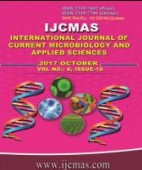


 National Academy of Agricultural Sciences (NAAS)
National Academy of Agricultural Sciences (NAAS)

|
PRINT ISSN : 2319-7692
Online ISSN : 2319-7706 Issues : 12 per year Publisher : Excellent Publishers Email : editorijcmas@gmail.com / submit@ijcmas.com Editor-in-chief: Dr.M.Prakash Index Copernicus ICV 2018: 95.39 NAAS RATING 2020: 5.38 |
Urinary Tract Infections (UTIs) in diabetics tends to remain a major health hazard, which are responsible for significant morbidity. It is Cross-sectional study. The urine samples were processed according to the standard protocol over a period of one year from March 2015 to May 2016. The antimicrobial susceptibility was tested by the modified Kirby-Bauer’s disc diffusion method as per the CLSI guidelines. Out of 400 diabetic patients, 185 (46.5%) had symptoms of UTI. Culture positivity was observed in 80.54% (149/185). Most common age group affected was between 46 -55 years (mean age is 53.8). Out of 149 culture positive samples, 112 (60.54%) Gram-negative bacilli and 37 (20%) Gram-positive cocci were isolated. The most common isolated uropathogen was E. coli (34.1%) followed by Klebsiella pneumoniae (15.1%), Enterococcus species (11.4%), Coagulase Negative Staphylococcus (cons) (1.6%), Staphylococcus aureus (7.02%), Acinetobacter species (3.2%), Citrobacter species (0.5%), Pseudomonas aeruginosa (5.9%), and Proteus species (1.6%). Among Gram negative bacilli, Imipenem (94.64%), Tobramycin (87.5%), Pipercillin-Tazobactum (75%), Amikacin (74.7%), Gentamicin (63.39%), Amoxicillin-Clavulinic acid (61.6%), Ceftazidime-Clavulanic acid (58.03%), Ceftriaxone (25.8%), Norfloxacin (25.4%) were found to be the most effective drugs. Among Gram positive pathogens Linezolid (100%), Vancomycin (67.7%), Amikacin (54.05%), Amoxycillin-Clavulanic acid (52%) were found to be more sensitive.
 |
 |
 |
 |
 |